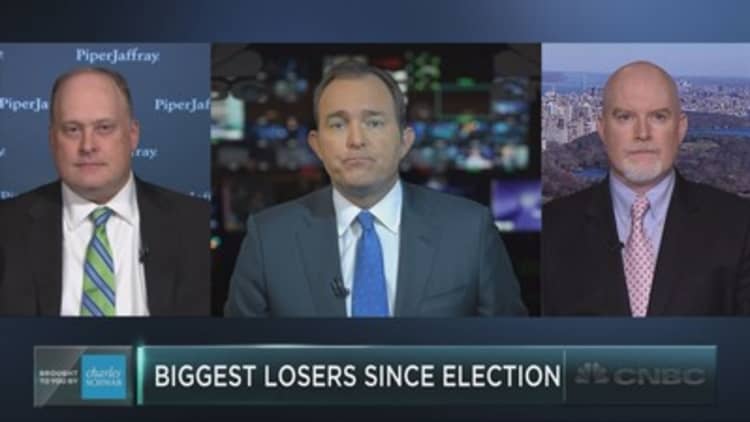
It's been nearly a year since the presidential election, and some of the stocks that have posted the biggest losses are classic American names.
Among large-cap stocks that have lost the most market cap since the Nov. 8 election are General Electric, AT&T and Procter & Gamble.
In that time, the embattled stocks have lost nearly $75 billion, $20 billion and $12 billion in market cap, respectively. At this point, some traders say, none of three looks primed for a buy.
"For the most part, it looks like there's a great deal of uncertainty around them. They are U.S. stocks, but primarily, their sales are international," Dennis Davitt, portfolio manager at Harvest Volatility Management, said Thursday on CNBC's "Trading Nation." "The Russell, the smaller caps, were the buy on the election because we were supposed to bring stuff back to the U.S. and repatriate back to the U.S. Their overseas sales may help them if the tax laws get put through."
Furthermore, the three stocks have their own fundamental issues surrounding them, Davitt said. Procter & Gamble may still face pressure from activist investor Nelson Peltz of Trian Partners, even as the company declared a victory over Peltz in what was the largest proxy battle in history.
Meanwhile, shares of General Electric are seeing a historically bad year, and the "vision" for the company under its new CEO is something investors are watching, Davitt said.
"Every day the stock goes lower, every day they talk about what different divisions they want to sell off," he added.
On a technical basis, General Electric, Procter & Gamble and AT&T are proving to be relative-strength laggards "all year long," said Craig Johnson, chief market technician at Piper Jaffray. He said he would "stay on the sidelines" with these names and avoid jumping in at these levels.
"I would say in terms of Procter & Gamble, when you look at that chart, you might be setting yourself up for a little bit of a relief rally. Two or three dollars from here, you come right back in to the 40-week moving average. Then, you're also right back into overhead resistance in a spot where I would suspect it would fail," Johnson said Thursday on "Trading Nation."
He sees similar poor relative strength in shares of AT&T, and shares of General Electric look poised to see a "whole new leg lower."
"I don't see a lot of great plays on options in these stocks, and I wouldn't buy any of them. I think if they make the changes they need to make to get great again, they're going to get sold out by their current holders before other people pick them up," Davitt said.





